
Source: http://www.wbur.org/hereandnow/2015/08/25/carter-center-guinea-worm
Today, I will be posting an article on another nematode (roundworm) popularly known as Guinea worm.
Dracunculus medinensis
Dracunculus medinensis is commonly known as guinea worm and it is the longest nematode that affect man.
This parasite is spread by drinking water containing guinea worm larvae. After ingestion, the parasite Lives in the sub cutaneous tissue of it host causing the disease known as "Dracunculiasis.*
Guinea worm is endemic in many region of India, Southern Sudan, Asia, West Africa particularly areas where communities depend on drinking water from ponds, wells and streams that contain an intermediate host. But today, the disease remains in six countries all in Africa; Sudan, Ghana, Mali, Ethiopia, Nigeria and Niger.
How does it affect man?
Guinea worm disease affect man once they drink water that contain guinea worm larvae as stated earlier. The guinea worm larvae is feed by fresh water crustacean called cyclops. This cyclops nocturnes the effective larva stage which is ejected into the stream or wherever the intermediate host is present.
Human infection starts when the intermediate host harboring the infected larvae is swallowed when drinking water, the larvae migrate to the stomach of the definite host(man).
When released in the stomach, it penetrates into the duo-dermal wall and migrate to the connective tissues of the auxiliary and inguinal where they grow into an adult female worm.
When the adult female worm is ready to come out, it creates a blister on the skin anywhere on the body, but usually on the legs and feet. This blister causes a very painful burning feeling and it bursts within 24-72 hours. Immersing the affected body part into water helps relieve the pain.
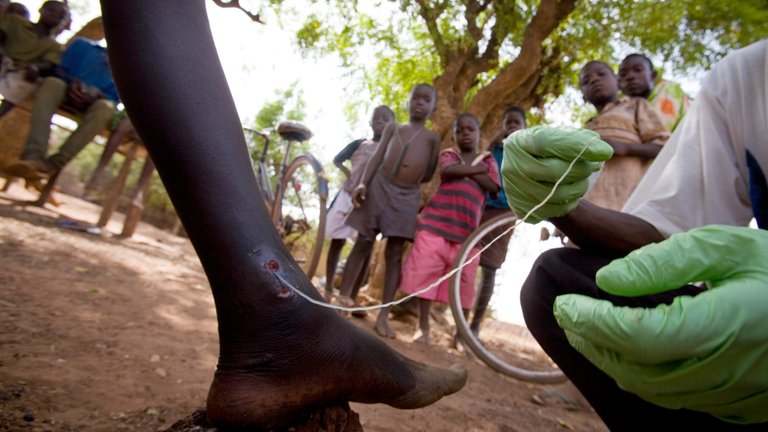
Source: http://www.gettyimages.com/detail/news-photo/medical-worker-abaare-hussein-right-extracts-a-guinea-worm-news-photo/112957717
It also causes the Guinea worm to come out of the wound and release a milky white liquid into the water that contains millions of immature larvae. This contaminates the water supply and starts the cycle over again. For several days, the female worm can release more larvae whenever it comes in contact with water.
Pathology
The clinical symptoms of infection occur during the emergent of the adult female woman at the body surface.
This stimulate nonspecific allergic reaction which result in the formation of itching and painful blisters.
This conditions is usually associated with fever, giddiness and gastrointestinal symptoms.
The symptoms subsides when the blister rupture to discharge the larva stage during douching (when the infected leg is immersed into the water so that the female worm can release it eggs outside and not inside the body).
The associate ulcer may become infected with secondary bacteria that can result in tetanus if it is in sepsis condition.
How can Guinea worm disease be prevented?
Guinea worm disease can be prevented by avoiding drinking unsafe water. Teaching people to follow these simple control tactics can completely prevent the spread of the disease:
Drink only water from protected sources (such as from boreholes or hand-dug wells) that are free from contamination.
Prevent people with swellings and wounds from entering ponds and other water used for drinking.
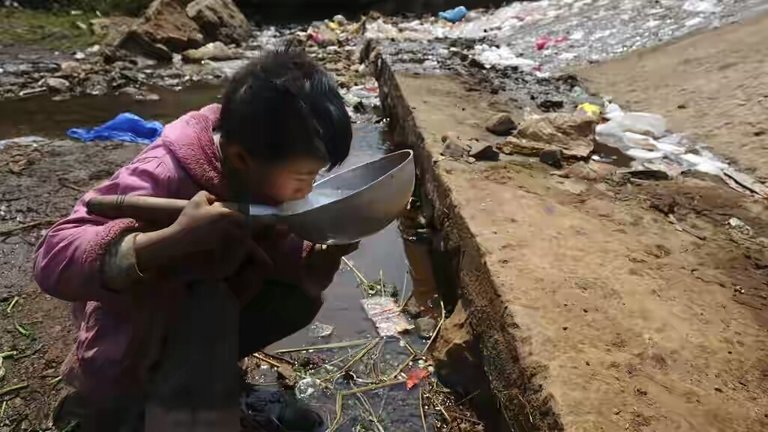
Source:http://hereandnow.legacy.wbur.org/2011/10/12/eradicate-guinea-worm
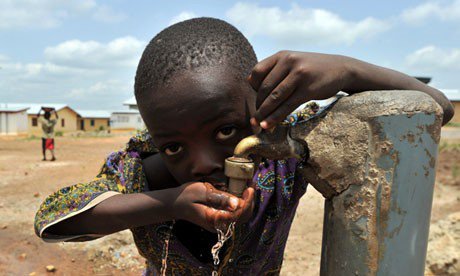
Always filter drinking water unsafe sources, using a cloth filter or a pipe filter, to remove the tiny "water fleas" that carry the Guinea worm larvae.
Treat unsafe drinking water sources with an approved larvicide, such as ABATE®. This will kill the tiny "water fleas."
Provide communities with new safe sources of drinking water and repair broken safe water sources (e.g., hand-pumps) if possible.
I will be dropping another episode of nematodes tomorrow and Thanks for reading and stay healthy. Please kindly comment,upvote and resteem if you find my research educative and informative.
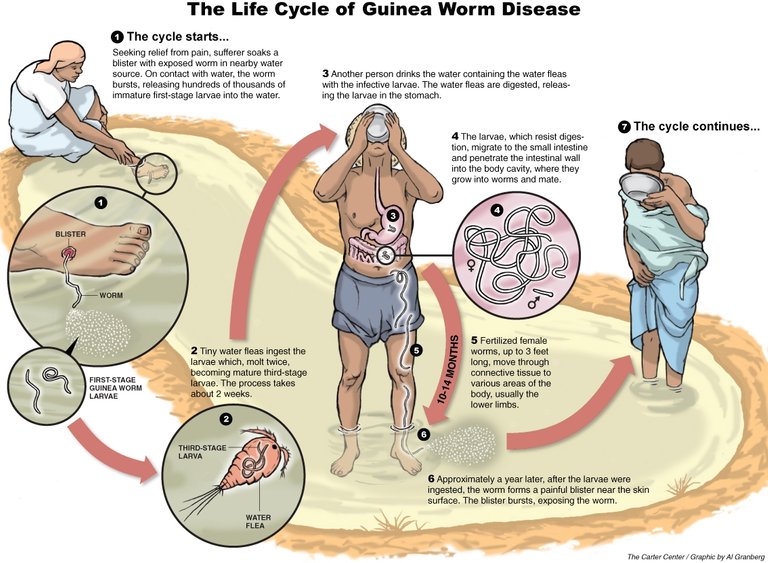
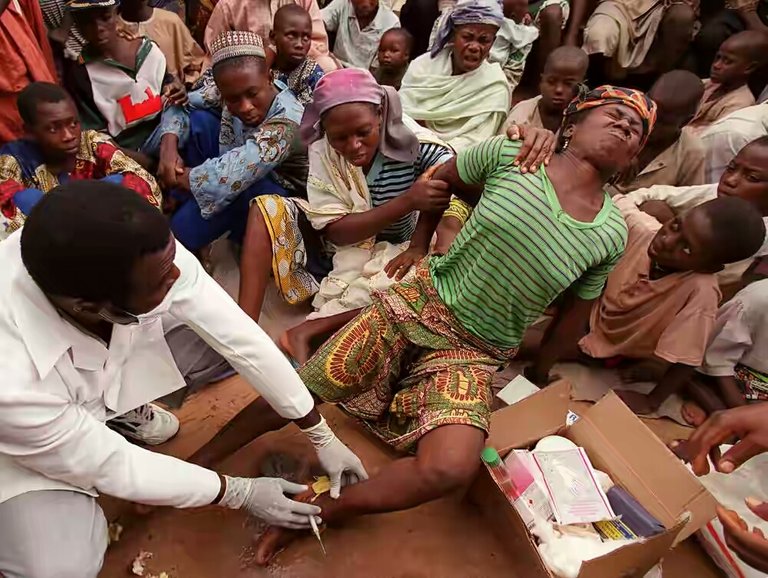
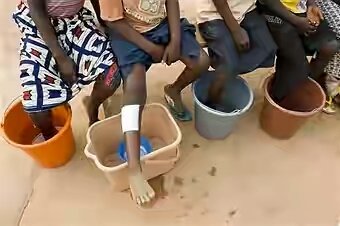
I couldn't look at some images, a family friend had an encounter with round worm, it was a horrible experience, lovely post!
Thanks dear.
Thanks for this.
This deserves some attention. Upvoted and resteemed...
Thanks for the comment
Congratulations! This post has been upvoted from the communal account, @minnowsupport, by greenlife500eu from the Minnow Support Project. It's a witness project run by aggroed, ausbitbank, teamsteem, theprophet0, and someguy123. The goal is to help Steemit grow by supporting Minnows and creating a social network. Please find us in the Peace, Abundance, and Liberty Network (PALnet) Discord Channel. It's a completely public and open space to all members of the Steemit community who voluntarily choose to be there.
If you like what we're doing please upvote this comment so we can continue to build the community account that's supporting all members.
This post has received a 0.39 % upvote from @drotto thanks to: @banjo.
Nice work, i have seen someone with it, before, i pity them , we really need to be careful, even if we didnt drink water containg guinea worm larvae, using that water to wash our fruits or even our hands before eating might cause it too, dont you think?nice work brother
If we make use of water that contain guinea worm to wash our fruits, it will definitely affect our health. Lets endeavor to watch the water we drink. Its very important....
Indeed a good ambassador of eurontion
Thanks boss
very awful.
Hi, nice post.
I am new on steemit and welcome you to steemit.
I have followed you and voted you. I will give vote to all of your new post. Please also follow me.
Best of Luck....
Alright dear. Welcome to steemit